What Activities Can You Do After Getting the COVID-19 Vaccine?
NewYork-Presbyterian experts explain what activities are safe — and when you still need to take precautions — if you’ve been fully vaccinated against COVID-19.
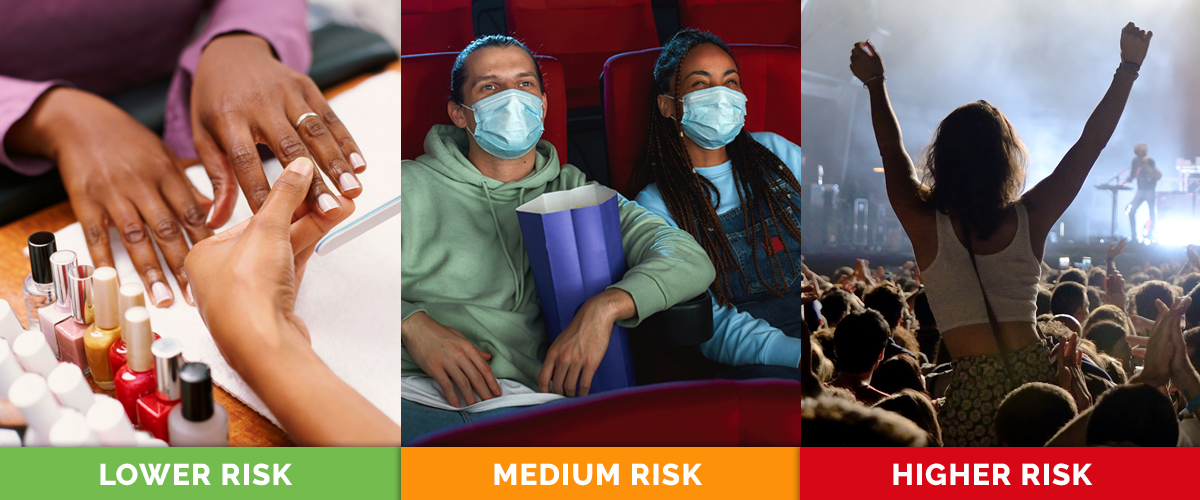

The Centers for Disease Control and Prevention (CDC) recently released new guidelines on what activities are safe for people who are fully vaccinated against COVID-19, which means two weeks have passed since they received the second dose of the Moderna or Pfizer-BioNTech vaccine or the single-dose Johnson & Johnson vaccine.
Fully vaccinated people can now gather indoors without masks or social distancing with other fully vaccinated people, and they can gather indoors with unvaccinated people from one other household (such as relatives who live together) without masks, unless any of those individuals is at increased risk for severe illness from COVID-19. And unless they show symptoms, vaccinated people no longer need to quarantine after exposure to someone with COVID-19.
The CDC said they will continue to revisit their COVID-19 guidelines as more individuals receive the vaccine, but these new recommendations are cause for hope that life might be getting back to normal. “We’re in the home stretch, not of completely beating the virus, but we’re in the home stretch of being able to start to fundamentally change our lifestyle back to something much closer to normal,” says Dr. Ashwin Vasan, an assistant attending physician in the Department of Medicine at NewYork-Presbyterian/Columbia University Irving Medical Center.
To help better understand what these new guidelines mean for the community, Health Matters spoke with several of our experts — Dr. Vasan, Dr. Sorana Segal-Maurer, director of the Dr. James J. Rahal, Jr. Division of Infectious Diseases at NewYork-Presbyterian Queens, and Dr. Sallie Permar, pediatrician-in-chief at NewYork-Presbyterian/Weill Cornell Medical Center and NewYork-Presbyterian Komansky Children’s Hospital.
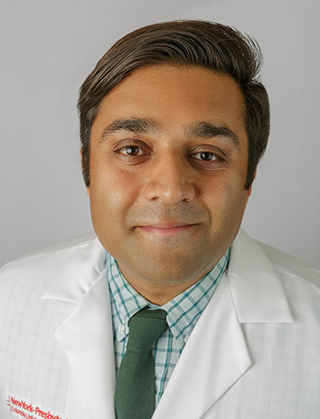
Dr. Ashwin Vasan
We know that vaccines protect people against severe COVID-19, but what do we know about the likelihood for vaccinated individuals to transmit the virus to others?
Dr. Vasan: There’s a growing body of evidence that suggests that the Pfizer and Moderna vaccines do in fact cut down on viral transmission. A recent study from the U.K. found that two doses of the Pfizer vaccine cut down someone’s chance of developing an infection that they could pass along by 86%. There was a study in Israel that found there was almost an 89.4% reduction. That’s pretty consistent with what we know about vaccination and disease transmission in general. There’s more definitive data we need in the long run, but I think that there’s a growing confidence amongst epidemiologists and virologists that vaccination against COVID-19 reduces the chance of transmitting the virus. We certainly have to continue to be cautious until we learn more.
For the Fully Vaccinated, What’s Safe to Do?
Dr. Ashwin Vasan of NewYork-Presbyterian/Columbia University Irving Medical Center ranks activities by risk level for those who have been vaccinated.
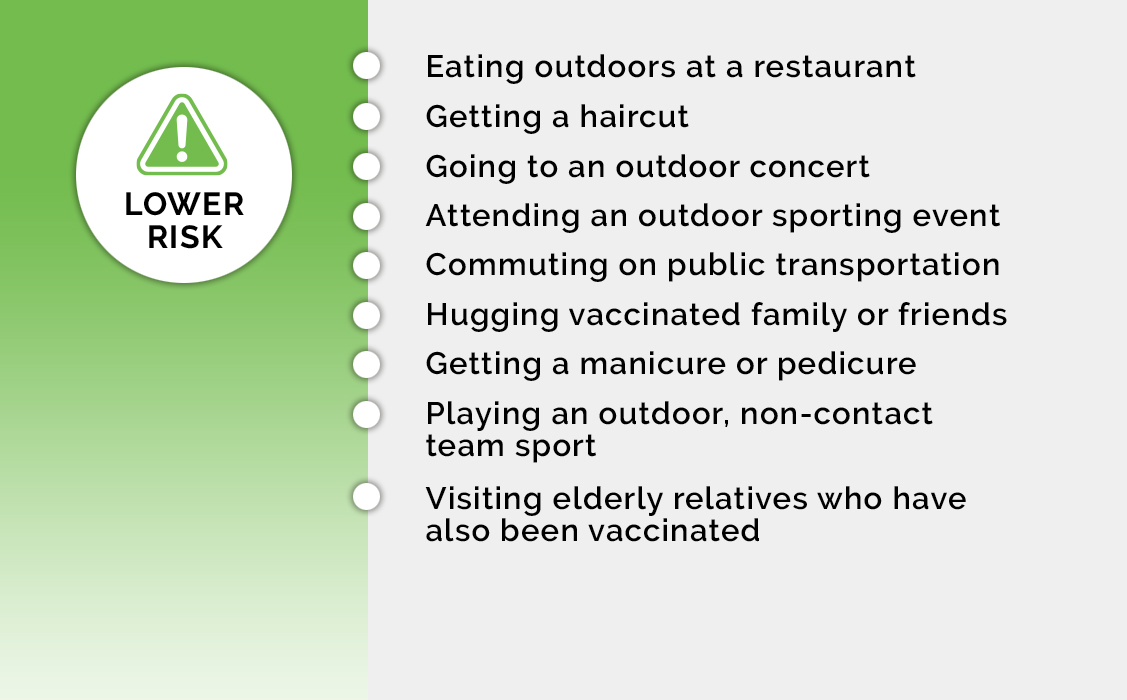
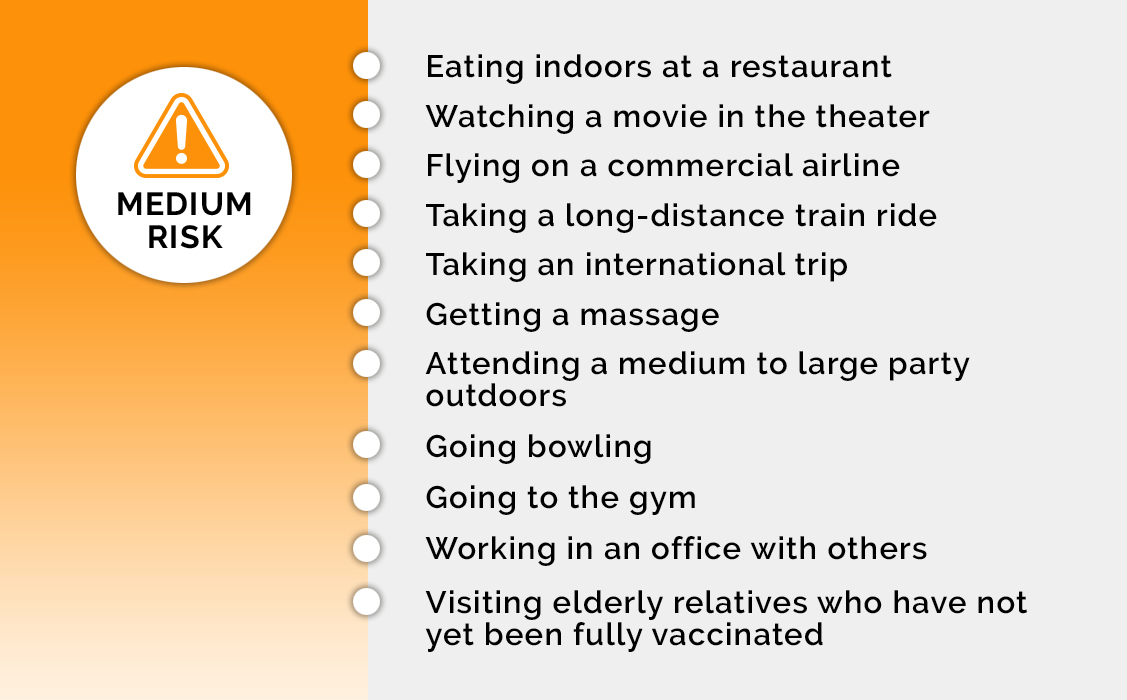
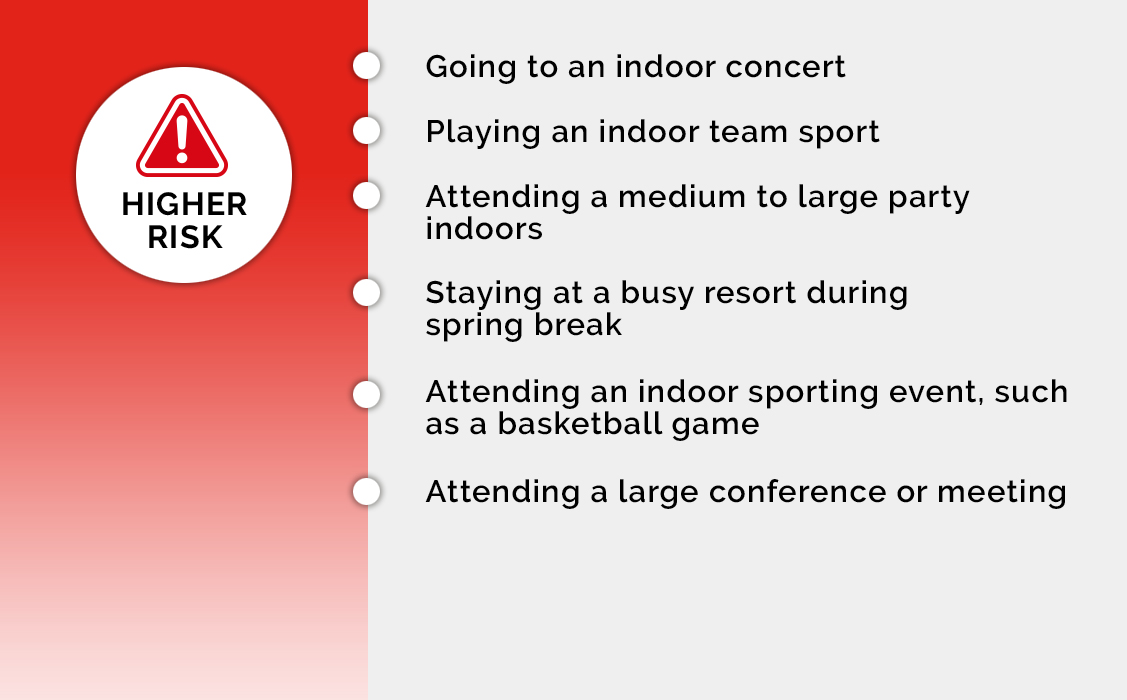
Is it safe for those who’ve been vaccinated to gather indoors with others who have not been vaccinated?
Dr. Segal-Maurer: There’s still a risk when combining vaccinated and unvaccinated people, especially adults. For that reason, the CDC suggests you can visit indoors with one other person or family if you have been fully vaccinated and they have not, but if it’s a large group, you should still wear masks and practice social distancing, especially if anyone in the unvaccinated group is at severe risk of COVID-19, such as those who are immunocompromised.
People with severe immunocompromised systems are still most at risk. Even if they have been fully vaccinated, it’s possible they may not mount the same reaction to the vaccine. We should still be cautious with this group.
Dr. Vasan: We’re also in this environment of the new variants, which we’re seeing are more transmissible. Here in New York, we’re still getting on the order of 4,000 cases a day. That’s driven mainly by the variants, both the U.K. variant and the New York variant. We’re still learning how effective the vaccines are against the variants. Early data shows that it may work against some, but be less effective against others. So when it comes to gathering, the CDC is advising that people not take the risk in large groups, and especially around people who are really at high risk of death from COVID or severe illness from COVID.
As people start to return to a sense of normal life after vaccination, what activities do you consider low risk and what are still high risk?
Dr. Vasan: Low-risk activities after vaccination are congregating with people who are also vaccinated, especially outdoors — such as play dates and barbecues — with one other or limited other families. Medium-risk activities will include flying, going to back to the office, and dining at a restaurant indoors, especially without proper spacing and ventilation. Higher-risk activities will continue to be indoor mass congregation events, like sporting events, concerts, and conferences.
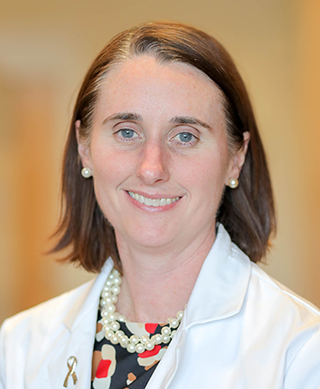
Dr. Sallie Permar
Is it safe for children to visit vaccinated grandparents? What precautions, if any, should be taken?
Dr. Permar: Yes, we consider grandchildren visiting their fully vaccinated grandparents safe. COVID-19 vaccines help prevent serious illness and hospitalization, so even if a child passed the virus to their fully vaccinated grandparents, they aren’t likely to get sick. Grandparents and grandchildren should hug for as long as they want!
People should still limit these gatherings to one household and keep it small because we don’t know yet if someone who may get the virus from a child or grandchild would be able to pass it along to someone else.
Dr. Segal-Maurer: It’s also very beneficial for elderly individuals to be in social situations. Numerous studies show that social isolation and increasing age is a terrible combination. When the elderly are in vibrant social situations, their mental state is better and their intellectual capabilities stay alert.
Why does the CDC recommend avoiding crowds and taking precautions in public places even if you’re fully vaccinated?
Dr. Segal-Maurer: If you’re going to an indoor venue, you will be with a mix of people, and there’s no way to know who’s been fully vaccinated and who hasn’t. That’s why masks and social distancing are still recommended. We want to go back to some sense of normalcy, but we have to walk before we run. This has been a difficult year. We can set a goal of getting together with family members who are vaccinated. Then get together with friends. We should take small steps and do things in a more measured way.
Dr. Vasan: It’s a numbers game. Meeting with one household who are unvaccinated versus entering into a crowded indoor setting where you have no idea who’s around you or what their vaccination status is — this is really just basic risk management. There’s still a high likelihood that even if you’re vaccinated, that most of the people around you are not.
Can you still get COVID-19 once fully vaccinated?
Dr. Segal-Maurer: Yes. The COVID-19 vaccines are not 100% efficacious, but you won’t be severely ill with COVID-19 if you have been fully vaccinated and still develop the virus. This is one of the tremendous benefits to vaccination.
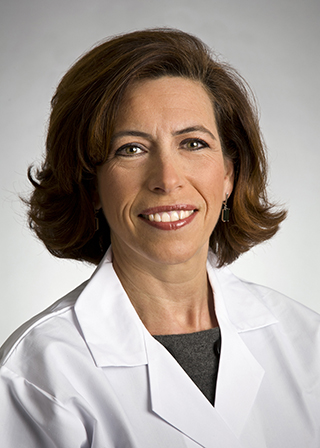
Dr. Sorana Segal-Maurer
Is it safe to travel if you’ve been vaccinated?
Dr. Segal-Maurer: Traveling puts you in numerous public venues — public transportation, departure lounges, or airplanes — where you’ll be in close contact with people who may or may not be fully vaccinated. If you are planning to travel, you should still follow all current precautions — wearing masks, practicing good hand hygiene, and social distancing. Airlines generally give you a temperature check before you get on a plane, so this is a little more controlled than going to a large indoor dining venue or indoor places where they don’t screen you when you go in, but all current travel precautions and guidance for where you are traveling to or from should still be followed.
Dr. Vasan: Even if you’re vaccinated, traveling puts you in a high-risk environment. You’re in an enclosed setting for an extended period of time, not always with the best circulation. It’s a setup for transmission, and we aren’t entirely certain about risk of reinfection. I would say that if you feel compelled to travel, to do so as safely as possible. Vaccination is not a panacea at the individual level. Everyone reacts differently to vaccines.
We know children under age of 16 cannot yet be vaccinated, but is it safe for children to go back to in-person school, day care, and summer camp?
Dr. Permar: It is very important for us to get children back to their usual activities, including school, sports activities, and day care, because we have seen some of the untoward effects of social isolation on children, which includes a very large mental health crisis, worsening obesity and fitness, and issues with child well-being in homes where they may be at risk of maltreatment.
Before the vaccines were developed, studies had shown that children do seem to be less likely to transmit the virus in a group setting, especially at the younger ages. Mitigation measures like masks, social distancing, and hand-washing are effective in settings where children gather, essentially eliminating the chance of transmission as long as these steps are taken. With vaccines now available to people who work in schools, day care, and camp settings, those settings should be even safer for children.

